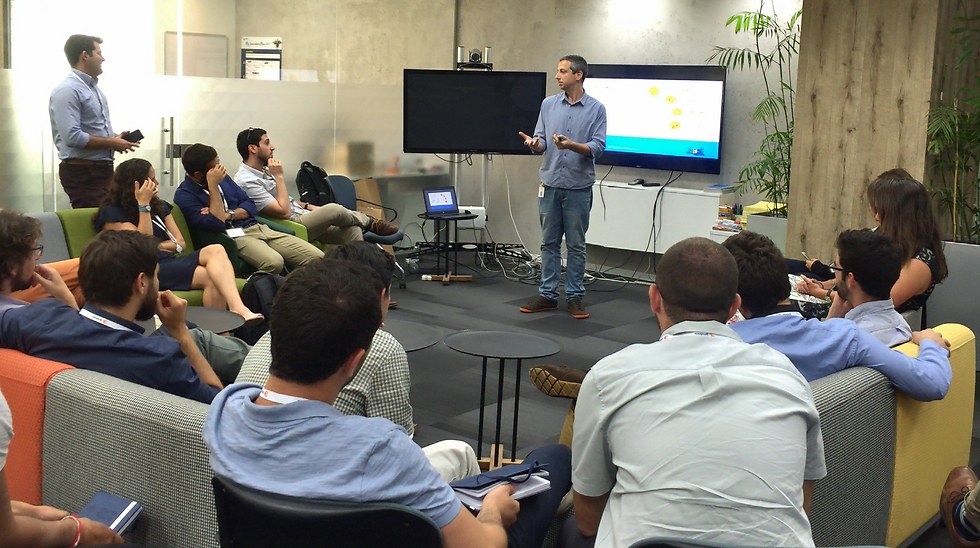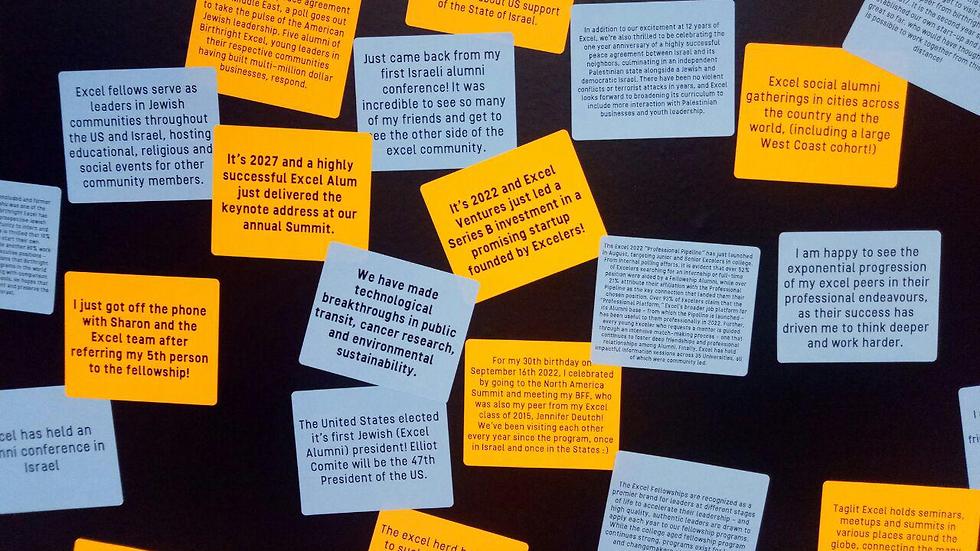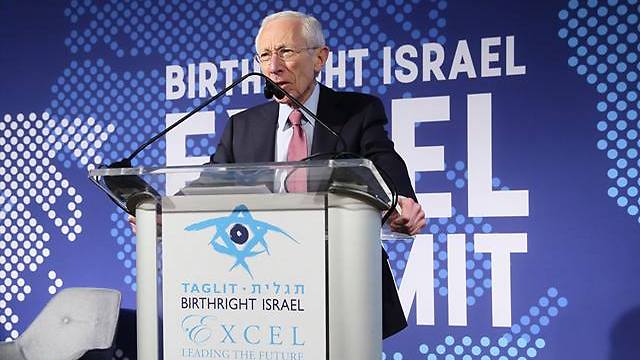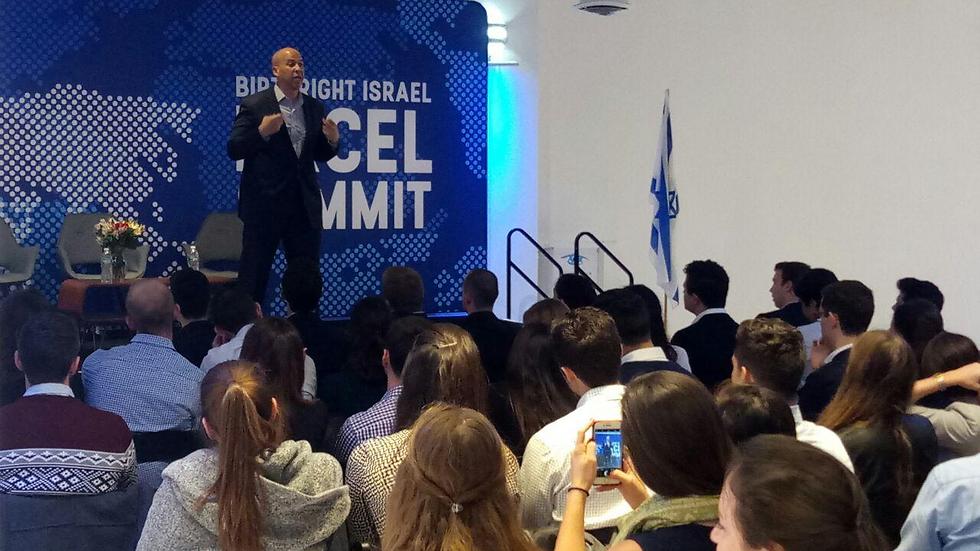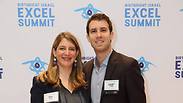

The program to keep Jewish money flowing into Israel
Launched seven years ago under the Birthright organization's umbrella, the Birthright Israel Excel business leadership program aims to foster Jewish rising stars of American economy and introduce them to the 'startup nation' to guarantee future investments in the State of Israel.
Launched seven years ago under the Birthright organization's umbrella, the Birthright Israel Excel business leadership program aims to "spot the next Michael Steinhardt, Lynn Schusterman and Paul Singer"—the future Jewish investors in the State of Israel.
"We must empower them both personally and in terms of the business community we will provide them with to reach that goal," explains Birthright Israel Excel Executive Director Noa Meir.
Keynote speakers at this year’s annual Excel Summit, held in New York earlier this month, were former Bank of Israel Governor Stanley Fischer, who told the program's graduates about the Israeli economy and why Israel will keep relying on economic support from the United States, and Senator Cory Booker of New Jersey, who has been dubbed by parts of the US Democratic camp as the "next Barack Obama" and received a standing ovation from the young Jews in the audience.
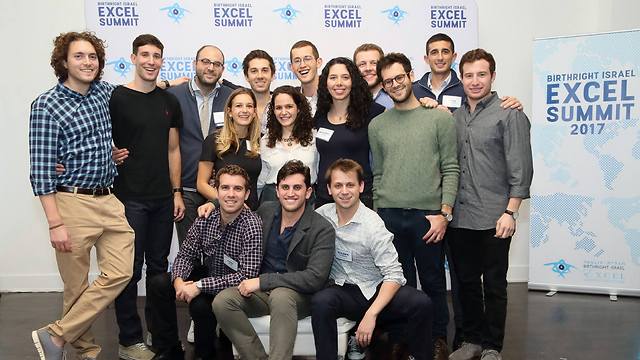
The Birthright Excel program offers business and ventures tracks in which some 55 students and entrepreneurs, selected from among more than 1,000 candidates studying in top US universities, come to Israel for 10 weeks for a professional internship in leading Israeli companies, particularly in the fields of technology and economy.
The program’s budget is roughly $1.5 million a year, and about a year ago, the Israeli government announced it would help fund the project in addition to its private donors—Michael Steinhardt, Lynn Schusterman and Paul Singer.
Israelis 'taking over' the program
Each student in the business track teams up with one of the Israeli participants—BA students and officers from leading IDF units—30 of whom attended the New York conference this year. The Israeli participants play an active part in the educational program and create personal ties with the North American participants, which gives them a chance to foster business contacts.
In Excel’s ventures track, eight Israelis who graduated from top IDF units and the country’s leading educational institutions, team up with 16 Americans and they all enter a 10-week accelerator, in which they receive tools for creating a startup company.
The original plan didn't include an integration of the Israelis into the community in that manner, Meir says. "It began with an Israeli joining an American as a friend or partner who isn't involved in the internship program, but only in the educational program in the evening and the social aspect, so that the Americans could connect to Israel as part of the educational and social content. But then what happened was that the Americans recognized the Israelis as part of this community, and everything started to fall into place. One Israeli who participated in the program had launched a startup and we are sending him an intern next summer, and there are always new job offers inside the group."
Participating in social protests
The purpose of the education program mentioned by Meir is basically to create an emotional connection between the Americans and Israel, in addition to their relationship with their Israeli colleagues, and its content is therefore carefully curated. Surprisingly, however, the list of events includes almost all parts of Israel's political and social spectrum.
In the summer of 2017, alongside a panel on Judaism with Knesset Member Yehuda Glick of the Likud party and Reform rabbis, the young participants watched the film "The Gatekeepers", critical of the Israeli defense establishment, and met former Shin Bet Director Yuval Diskin. They also took part in a panel with Prof. Nafez Nazzal, a Palestinian writer, and Said Abu Shakra, founder of the Umm al-Fahm Art Gallery.
"To create an authentic and durable connection, they must get the real picture," Meir explains. "We took them to Nazareth and introduced them to Israeli Arabs working in high-tech, and we’re introducing them to all of Israel's minority populations, including Haredim, Ethiopians and Druze, and it opens both their eyes and the Israelis' eyes. And even if a certain issue angers them, they say: 'Wow, there’s so much diversity here!'
"We’re a Zionist program of course, but there’s a wide spectrum inside. We tell them: You’ll leave Israel with more questions than answers. On the one hand, it's frustrating, but on the other hand, there’s no other way actually to connect to the place. They take part in difficult conversations. People talk to them about all the difficult issues, and it engenders debate with their Israeli colleagues."
Living for 10 weeks in Tel Aviv, the young participants experience Israelis' cost of living difficulties as well. Becky Haft participated in the first class of the program in the summer of 2011, when Israelis took to the streets as part widespread social protests. She did her internship at the Tnuva food company, which was dealing with a boycott at the time over cottage cheese prices. "There were a lot of conversations about the cost of living and a lot of protests," she says. "At first, I didn't understand what it was all about, and my manager at Tnuva was stressed out over the whole thing.
"We went to the protest at Rabin Square and to the Rothschild Boulevard protest, so we got to feel the protest and understand the internal politics. We were able to understand the internal economy and see that on one side there’s the startup nation, but on the other side there are poor people as well."
Cultural differences
Galit Krifcher, 24, of Maryland participated in the program in 2014. "There's no doubt that life in Israel isn't easy," she says, "but my perception before arriving in Israel was that most of the challenges Israelis face have to do only with the Israeli-Palestinian conflict, so the first thing I wanted was to understand and talk about the conflict.
"From the time I spent in Israel and from my conversations with my Israeli colleagues in the program, I began realizing that the conflict is indeed a big challenge, but that Israel is much more than that. And if I want to become a real ambassador of Israel, I must also understand the daily challenges Israelis are dealing with, like the cost of living, an internal rift as a result of the division into different sectors, and a young generation which is unhappy with the way its government is running the country and is demanding a change."
Krifcher adds that getting to know Israeli culture helped her with her job as investor in a venture capital firm: "An investor who isn't familiar with the Israeli high-tech market, and hasn't thought of investing in it, is seriously lagging behind. The innovations taking place in Israel are unprecedented.
"Through Excel, I developed a network of connections with investors and entrepreneurs in the Israeli and American market, but more importantly, the time I spent in Israel helped me understand Israeli business culture so I could get a better understanding of how to talk to entrepreneurs.
"It’s no secret that the Israeli way of communication is significantly different from the American way, and I think that a considerable part of American investors are intimidated at first when they talk to Israeli entrepreneurs because of these cultural differences."
Stanley Fischer and 'the next Obama'
The keynote speaker at the summit, organized by the graduates almost on their own, was former Bank of Israel Governor Stanley Fischer, who resigned as vice chairman of the Federal Reserve for personal reasons about two months ago.
Fischer recounted the story of his life as a Jew who was educated abroad and discussed how he became governor of the Bank of Israel . He then offered his perception of the Israeli economy's problems. Focusing on Israel’s "bad" educational system, he said that "if you’re sending people to very different educational systems, you are not creating a nation. You’re creating a group of very different people."
Fischer further argued that there were two other issues holding back the Israeli economy: low employment rates among ultra-Orthodox men and the non-existent peace process along with the Iranian threat. These two issues, he said, create a defense budget which Israel has trouble dealing with. Israel, he said, will keep relying on US help to shoulder its security burden.
The other keynote speaker, Senator Cory Booker, spoke about working with political rivals and why it's important. He used many examples from the Torah, demonstrated his knowledge of Hebrew and received a standing ovation from the audience.
The summit was moderated by Avery Rosen, who graduated from the program's first class in 2011.
Rosen described his most meaningful impression from his time in Israel: "I got to see the amazing combination of entrepreneurial thought and a sense of 'urgency,' which create the Israeli startup nation. In the past five years, I have been working as an investor in developing startups in a venture capital firm in the US, and I use the skills I learned during that summer in Israel. Our Israeli members are immensely talented people, and it’s really special being part of such an American-Israeli collaboration."
While the program's goal is to create future Jewish investors in Israel and not necessarily to get them to make aliyah, there are some exceptions. One such exception involves Ilan Regenbaum, who also participated in the program.
"Most of my life, I saw Israel as religion and politics," he says. "That was the first time I lived in Tel Aviv over a long period of time, and I saw it had culture and business you won't find anywhere in the world. And in general, the Israeli high-tech scene is second only to Silicon Valley."
Regenbaum returned to the US, and after completing his studies he decided to make aliyah. "I'm not living in a fantasy world. I saw the difficulties involved in living in Israel, and there are many problems, but I felt that in Israel I could do something meaningful and not just be a small part of a large system like I was in the US. Excel was the first time I realized I could really make a difference here."
At first, Regenbaum worked in venture capital funds and in startups in Israel, but after enlisting with the IDF for half a year, he decided to stay in the army. Today he heads the Israel Air Force’s Innovation Department.
"Most people in Excel are people who see problems and want to do something about it, both the Americans and the Israelis. And I’m sure they'll get Israel involved in it too, because they understand that investing in Israel is not charity, it’s a business opportunity."
Asked whether the program is meeting its goals and whether the people funding it are already seeing some results, Meir says there are only occasional success stories right now, and a long-term effect requires a bit more patience.
"One of the graduates wrote on our wall of dreams that in 10 years from now, all lecturers at the summit will be Excel graduates. When we see these young people investing their time and money in the State of Israel in the future, we'll know we succeeded.”
The writer was a guest of Birthright Israel Excel in New York.














